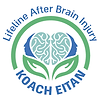World Aphasia Shabbat 2026
January 10, 2026 - 21 Tevet 5786
What is the objective of the Koach Eitan World Aphasia Shabbat?
The goal of World Aphasia Shabbat is to educate communities about aphasia. How it presents, the challenges of living with it within Jewish communal life, and what we can do, to help connect with and include those living with aphasia. By learning about aphasia and practicing our tools and tips in order to be more inclusive, communities can lessen the feelings of loneliness that people with aphasia (and other disabilities) often experience.

Why Shabbat?
On Shabbat, people have time to come together. The slower pace makes it the perfect time to increase our awareness of those around us - how they might be struggling, and what we can do to help. Shabbat and holidays can present many challenges to those with aphasia.
Routine Shabbat tasks may be exceedingly difficult with them, like:
-
Making kiddush
-
Participating in conversation at the Shabbat table
-
Leading davening
-
Learning and discussion
-
Reading from a siddur
-
Leisure reading
-
Socializing
People with aphasia have trouble speaking, reading, and understanding conversations. As a result, just being in shul where everyone is reciting prayers, following the Torah reading, and greeting friends can sometimes be a painful and challenging experience. They simply cannot participate and engage like they used to. By dedicating a Shabbat to learning about aphasia, we hope to ease this struggle and help make Shabbat a time of joy for all members of the community.
What can you do?
Learning about aphasia can dissipate some of the fear or awkwardness we may feel in approaching those who have aphasia. It is our responsibility as individuals and as a community to try to learn, understand and become more aware, so that connecting, including, and communicating with those challenged is just as normal as talking to your friend or neighbor.
Leora and Eitan, and the Koach Eitan team, will provide educational materials to all participating shuls and communities. The materials will include explanations on what it’s like to live with aphasia, and how to talk and communicate better with an aphasic person. This will help you to become more aware of those in your community who are challenged with language impairments. Increased awareness will hopefully lead to the creation of more opportunities for inclusion. Being included will reduce the loneliness and frustration in those with aphasia. It will enhance inter-communal connection and allow more people to participate in and enjoy Jewish life. We hope that your community will ultimately learn to see past the limitations, and view people with aphasia as the individuals that they are, despite their loss of language. This Aphasia Shabbat will not only teach about aphasia but will also give perspective on other disabilities that people are challenged with and how they too should not be ignored but understood.
.jpg)
Implementing the Shabbat
-
Print out the Koach Eitan “Let’s Talk” magnet, the Koach Eitan Erev Shabbat Candle lighting Blessing Card with Icons and the Halachic Guide to Aphasia and Brain Injury and distribute them in the shul. This will encourage community members to learn about aphasia, and to reach out to aphasic people within the community. These materials also provide tips for successful communication.
-
The Rabbi, Gabbai or shul representative can use one of the Shabbat Divrei Torah we will provide prior to the Shabbat in their Shabbat drashot/ sermons.
-
Invite a speech therapist, psychologist, or psychiatrist in the community, and host an oneg/afternoon talk about aphasia and other speech impairments, and the importance of including and connecting with those who experience language challenges.
-
If there is an aphasic person or someone living with different language challenges in the community, invite him/her to try to speak about their experiences and possibly answer questions alongside a friend, spouse, or caregiver.
-
Even if you cannot focus on World Aphasia Shabbat during shul, you can mention this event in your Shul announcements. Even this is a great way to raise awareness within your community.







